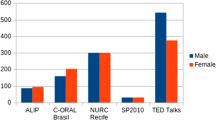Abstract
Czech is a very specific language due to its large differences between the formal and the colloquial form of speech. While the formal (written) form is used mainly in official documents, literature, and public speeches, the colloquial (spoken) form is used widely among people in casual speeches. This gap introduces serious problems for ASR systems, especially when training or evaluating ASR models on datasets containing a lot of colloquial speech, such as the MALACH project. In this paper, we are addressing this problem in the light of a new paradigm in end-to-end ASR systems – recently introduced self-supervised audio Transformers. Specifically, we are investigating the influence of colloquial speech on the performance of Wav2Vec 2.0 models and their ability to transcribe colloquial speech directly into formal transcripts. We are presenting results with both formal and colloquial forms in the training transcripts, language models, and evaluation transcripts.
Access this chapter
Tax calculation will be finalised at checkout
Purchases are for personal use only
Similar content being viewed by others
References
Babu, A., et al.: XLS-R: self-supervised cross-lingual speech representation learning at scale. arXiv preprint arXiv:2111.09296 (2021)
Baevski, A., Mohamed, A.: Effectiveness of self-supervised pre-training for ASR. In: ICASSP 2020–2020 IEEE International Conference on Acoustics, Speech and Signal Processing (ICASSP), pp. 7694–7698 (2020)
Baevski, A., Zhou, Y., Mohamed, A., Auli, M.: Wav2Vec 2.0: a framework for self-supervised learning of speech representations. Adv. Neural Inf. Process. Syst. 33, 12449–12460 (2020)
Byrne, W., et al.: Automatic recognition of spontaneous speech for access to multilingual oral history archives. IEEE Trans. Speech Audio Process. 12(4), 420–435 (2004). https://doi.org/10.1109/TSA.2004.828702
Chen, S., et al.: WavLM: large-scale self-supervised pre-training for full stack speech processing. arXiv preprint arXiv:2110.13900 (2021)
Conneau, A., Baevski, A., Collobert, R., Mohamed, A., Auli, M.: Unsupervised cross-lingual representation learning for speech recognition. In: Hermansky, H., Cernocký, H., Burget, L., Lamel, L., Scharenborg, O., Motlícek, P. (eds.) Interspeech 2021, 22nd Annual Conference of the International Speech Communication Association, Brno, Czechia, 30 August–3 September 2021, pp. 2426–2430. ISCA (2021). https://doi.org/10.21437/Interspeech. 2021–329. https://doi.org/10.21437/Interspeech.2021-329
Cummins, G.M.: Literary czech, common czech, and the instrumental plural. J. Slavic Linguist. 13(2), 271–297 (2005), https://www.jstor.org/stable/24599659
Devlin, J., Chang, M.W., Lee, K., Toutanova, K.: BERT: pre-training of deep bidirectional transformers for language understanding. arXiv preprint arXiv:1810.04805 (2018)
Graves, A., Fernández, S., Gomez, F., Schmidhuber, J.: Connectionist temporal classification: labelling unsegmented sequence data with recurrent neural networks. In: Proceedings of the 23rd International Conference on Machine Learning, pp. 369–376 (2006)
Heafield, K.: KenLM: faster and smaller language model queries. In: Proceedings of the Sixth Workshop on Statistical Machine Translation, pp. 187–197. Association for Computational Linguistics, Edinburgh, Scotland, July 2011. https://aclanthology.org/W11-2123
Hsu, W.N., Bolte, B., Tsai, Y.H.H., Lakhotia, K., Salakhutdinov, R., Mohamed, A.: Hubert: self-supervised speech representation learning by masked prediction of hidden units. IEEE/ACM Trans. Audio Speech Lang. Process. 29, 3451–3460 (2021)
Liu, A.T., Li, S.W., Lee, H.Y.: TERA: self-supervised learning of transformer encoder representation for speech. IEEE/ACM Trans. Audio Speech Lang. Process. 29, 2351–2366 (2021)
Psutka, J., et al.: Issues in annotation of the Czech spontaneous speech corpus in the MALACH project. In: Proceedings of the Fourth International Conference on Language Resources and Evaluation (LREC 2004), pp. 607–610. European Language Resources Association, Lisbon (2004)
Psutka, J., Ircing, P., Psutka, J.V., Hajič, J., Byrne, W., Mírovský, J.: Automatic transcription of Czech, Russian and Slovak spontaneous speech in the MALACH project. In: Eurospeech 2005, pp. 1349–1352. ISCA (2005)
Psutka, J., Radová, V., Ircing, P., Matoušek, J., Müller, L.: USC-SFI MALACH Interviews and Transcripts Czech LDC2014S04 (2014). https://catalog.ldc.upenn.edu/LDC2014S04
Psutka, J.V., Pražák, A., Vaněk, J.: Recognition of heavily accented and emotional speech of English and Czech Holocaust survivors using various DNN architectures. In: Karpov, A., Potapova, R. (eds.) Speech and Computer, pp. 553–564. Springer International Publishing, Cham (2021). https://doi.org/10.1007/978-3-030-87802-3_50
Tahal, K.: A Grammar of Czech as a foreign language. FACTUM CZ, s.r.o. (2010)
Vaswani, A., et al.: Attention is all you need. In: Proceedings of the 31st International Conference on Neural Information Processing Systems, pp. 6000–6010. NIPS 2017. Curran Associates Inc., Red Hook, NY, USA (2017)
Wang, C., et al.: VoxPopuli: a large-scale multilingual speech corpus for representation learning, semi-supervised learning and interpretation. In: Proceedings of the 59th Annual Meeting of the Association for Computational Linguistics and the 11th International Joint Conference on Natural Language Processing, vol. 1: Long Papers, pp. 993–1003. Association for Computational Linguistics, Online, August 2021. https://aclanthology.org/2021.acl-long.80
Wolf, T., et al.: Transformers: state-of-the-art natural language processing. In: Proceedings of the 2020 Conference on Empirical Methods in Natural Language Processing: System Demonstrations, pp. 38–45. Association for Computational Linguistics, Online, October 2020. https://www.aclweb.org/anthology/2020.emnlp-demos.6
Acknowledgments
This research was supported by the ITI project of the Ministry of Education of the Czech Republic CZ.02.1.01/0.0/0.0/17 048/0007267 InteCom. Computational resources were supplied by the project “e-Infrastruktura CZ" (e-INFRA CZ LM2018140) supported by the Ministry of Education, Youth and Sports of the Czech Republic.
Author information
Authors and Affiliations
Corresponding author
Editor information
Editors and Affiliations
Rights and permissions
Copyright information
© 2022 Springer Nature Switzerland AG
About this paper
Cite this paper
Lehečka, J., Psutka, J.V., Psutka, J. (2022). Transformer-Based Automatic Speech Recognition of Formal and Colloquial Czech in MALACH Project. In: Sojka, P., Horák, A., Kopeček, I., Pala, K. (eds) Text, Speech, and Dialogue. TSD 2022. Lecture Notes in Computer Science(), vol 13502. Springer, Cham. https://doi.org/10.1007/978-3-031-16270-1_25
Download citation
DOI: https://doi.org/10.1007/978-3-031-16270-1_25
Published:
Publisher Name: Springer, Cham
Print ISBN: 978-3-031-16269-5
Online ISBN: 978-3-031-16270-1
eBook Packages: Computer ScienceComputer Science (R0)




